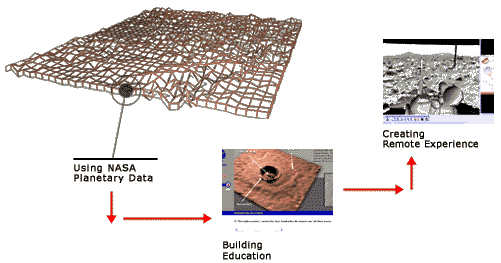| |

When NASA sends robots to other planets or remote parts of the Earth,
scientists at Mission Control computers use virtual reality to experience
those places as if they were there. The goal of the EventScope project
at Carnegie Mellon University is to create classroom computer interfaces
and curriculum…
| |
To
extend the exploration capabilities to middle school students as
a means of expanding their interest in science and technology,
To bring other planets, distant continents, and NASA robotic mission
sites directly into the classroom. |
EventScope,
a NASA-funded project with support from local foundations, is an educational
tool designed to engage students in learning science through a three-dimensional
game-like computer interface. EventScope allows students to virtually
explore faraway places through their computers, enabling them to experience
the same kind of "tele-presence" that scientists currently
use to investigate remote worlds. The project currently uses NASA data
from past Mars missions (Viking and Pathfinder) to excite students in
scientific inquiry and discovery. The flexible, modularized two to three
week curriculum package includes teacher lesson plans, computer-based
labs, and student workbooks that address national science standards
and benchmarks. EventScope also provides teacher-training workshops
and curriculum assessments.
EventScope
was pilot tested in three middle schools last fall and expanded to nine
schools in Spring 2001 and thirty-six schools in Fall 2001. EventScope
is currently recruiting teachers to test pilot modules covering Earth
and Mars: Telling the Stories of Planetary Features and The Pathfinder
Landing Site and Other Mysteries on Mars.
If you
are interested in participating in EventScope's free pilot deployment
in Fall 2001 please contact Jennifer Young, Project Coordinator, 412-268-5515,
jyoung@andrew.cmu.edu. More
information is available on our Web site: http://www.eventscope.org
| |
"An
important use of technology is its capacity to create new opportunities
for curriculum and instruction by bringing real-world problems into
the classroom for students to explore and solve."
National Research Council |
|
|
|

